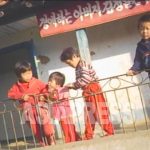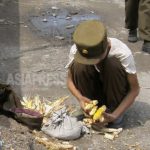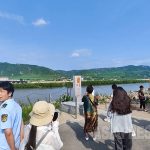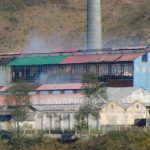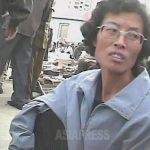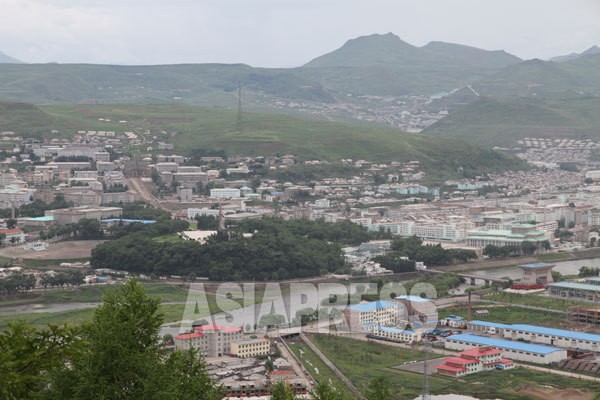
The restart of land-based trade between Hyesan in Yanggang Province and Changbai Korean Autonomous County in Jilin Province led to the recent visit to North Korea by a Chinese trade delegation. However, there’s reportedly little interest toward trade with North Korea among Chinese business people due to discontent about North Korea trade policies. (KANG Ji-won / ISHIMARU Jiro)
◆ Delegation members quarantined for two days
According to a reporting partner in Yanggang Province on November 13, a Chinese trade delegation visited North Korea in early November. Originally, the delegation was supposed to be made up of dozens of people, but a lack of interest in the restart of trade with North Korea led only five or so people to take part in the delegation.
The reporting partner told ASIAPRESS that it is “probably the first time since January 2020, when the borders were closed due to the pandemic, that Chinese people have entered North Korea through the Hyesan trade route.” He went into more detail:
“The Chinese people who entered the country were isolated in a government-designated facility for two days. Even after that, they were not allowed to meet with just anyone; only those who had registered to meet with them in advance. North Korean trade officials were required to wear masks, and only a limited number of people were allowed to have meals together. They also had to report their health to the Anti-epidemic Command for two days.
“The Chinese trade officials who visited the country focused on taking back capital that had been invested on certain projects in the past and confirmed conditions of imports and exports, not on exploring new investments in North Korea. Most members of the delegation were agents for (Chinese) business people.”
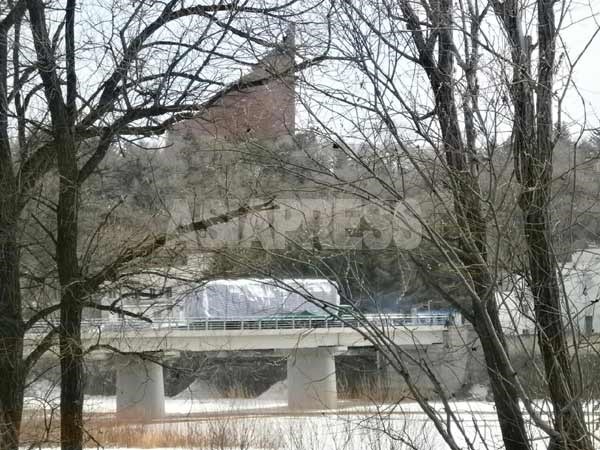
◆ Chinese import volume small due to lack of funds
The reporting partner also explained what kinds of imports and exports are occurring between the two countries:
“With the start of November, North Korea has imported small amounts of rice, raw ingredients, cloth, and cooking oil from China. Imports do not include finished clothing products or consumer goods. The goods imported from China are not being distributed in Hyesan; rather, they are going to other areas. The goods aren’t going into markets like in the past, so commodity prices haven’t fallen.
“North Korea isn't exporting yet. Trading companies aren’t ready to export mountain greens or Korean medicinal products, and the government has yet to give permission for such exports.”
This reporting partner also said that one of the reasons why imports from China are so small in scale is because of a lack of money.
“The authorities tell enterprises to submit lists of products they want to import to the trade bureaus, but none of the companies have money, so they can’t do that. Moreover, members of the donju (North Korea’s wealthy entrepreneurial class) are not allowed to manage the distribution of food and goods domestically, so trading companies have no wholesalers to sell their imports to, and are forced to give the imports to state-run distribution networks. That’s why money isn’t circulating that much.”
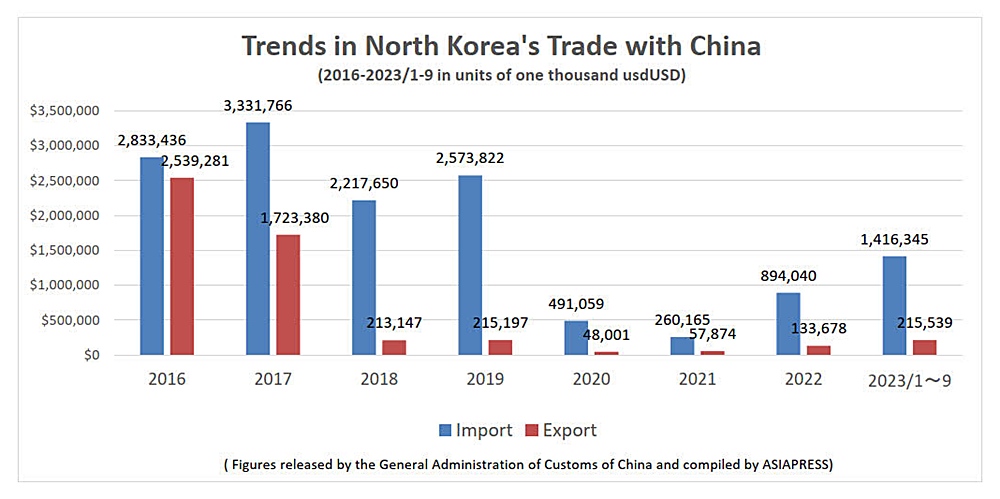
◆ Chinese business people distrust North Korean trade policies
In mid-November, ASIAPRESS asked a trade agent in Jilin Province well aware of conditions in North Korea about the restart of trade and the visit of the Chinese delegation. He told ASIAPRESS that most Chinese business people have a dim view of the restart of trade with North Korea.
The explanation provided by the agent is below:
“The North Koreans insist on importing raw materials rather than regular consumer goods. The Chinese are strictly limiting trade with North Korea due to economic sanctions, and Chinese customs closely look at whether sanctioned items are included in raw material exports to North Korea. Food, however, is exported without issue.
Up until now, Chinese trade companies that did business with Hyesan are content with a wait-and-see approach, and are not actively pursuing exports to North Korea. On a daily basis, five large trucks enter North Korea, with up to 10 trucks entering the country on busy days. China is probably not importing anything from North Korea.
North Korean authorities have talked about restrictions on trade and joint ventures with China. The Chinese are now negotiating directly with Cabinet-affiliated trade agencies, rather than negotiating with individual trade companies like in the past. There are probably few people who would invest in North Korea.
Moreover, North Korean authorities are demanding that restrictions be placed on Chinese business people. In short, they want to conduct transactions with large companies in China. They want to pursue joint ventures and investments in construction projects, but there’s issues regarding the US-China relationship and sanctions on North Korea. There’s also distrust by the Chinese in regards to North Korea’s long border shutdown due to the pandemic, so many people are very uninterested in new investment in North Korea.
The North Koreans are also proposing ways to promote tourism. However, there’s nobody in China who’d be interested in tourism yet because of North Korea’s quarantine policies. On the other hand, the Chinese are highly interested in North Korean labor deployments and contract manufacturing (in North Korea). There are trading companies that want to be part of those kinds of deals.”
◆ Trade activities restart in only western region of North Korea
North Korea-China trade recovered quickly following the end of China’s zero-COVID policies in late 2022. Chinese customs statistics show that trade totals up until June of this year have already surpassed last year’s total trade volume, and that trade volume has almost returned to levels seen before the COVID-19 pandemic.
However, most China-North Korea trade is concentrated in two places: the water trade route centered at Nampo Port, and the railroad-centered trade route going through Sinuiju. It is still too early to tell when trade in other areas will restart.
※ ASIAPRESS communicates with reporting partners through Chinese cell phones smuggled into North Korea.
- <Inside N. Korea> ASIAPRESS confirms that defectors were forcibly repatriated in October…N. K authorities warn would-be defectors that they will be caught by facial recognition systems in China
- <Inside N. Korea>Speaking to a Border Guard (1) Landmine Burial at the Korea-China Border? “Even soldiers are afraid because they don’t know where they’re buried”
- <Inside N. Korea>Opium addicts rise again as stimulants remain almost completely unavailable…Why? The police quickly clamp down on manufacture of drug
- <Inside N. Korea> A recent report on conditions at farms (1) The harvest is better than last year, but lack of materials remains a serious problem (4 recent photos)
- <Photo Report>The North Korea-China Border (1) In August, Tumen and the midstream of the Tumen River was quiet

